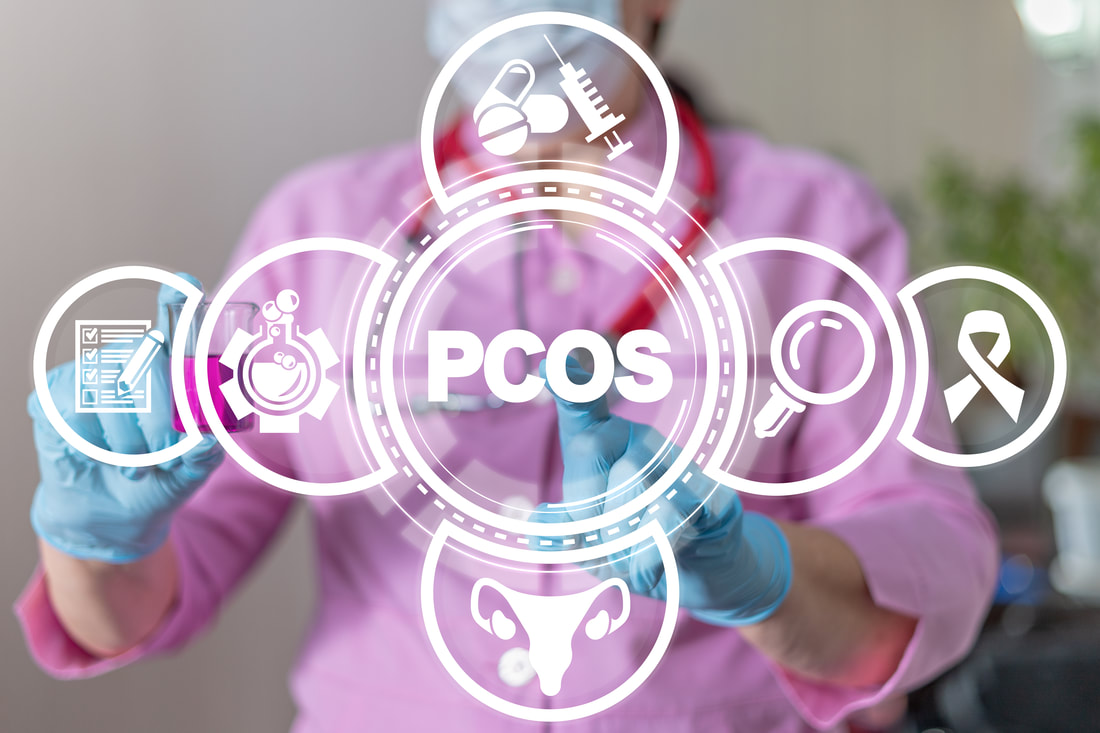|
Polycystic ovary syndrome (PCOS) is a common endocrine disorder that affects 5-20% of women of reproductive age worldwide. PCOS is characterised by increased levels of androgen hormones such as testosterone and menstrual / ovulatory dysfunction. It is frequently accompanied by insulin resistance and obesity, resulting in a high risk for type 2 diabetes and cardiovascular disease. Losing body weight when you have PCOS is difficult – and it should not be your primary focus. Focus instead on moving regularly (sit less) and eating a wide variety of fresh, unprocessed food which will have a real impact on improving your fertility. Lifestyle Modification Works! Ovulation rates improve dramatically in women with PCOS after adopting an active lifestyle and eating a nutritionally balanced, energy restricted diet [3, 4]. Live birth rates also more than double! [3]. Delaying fertility treatment to give yourself time to be the healthiest you can be is associated with improved assisted reproductive treatment outcomes. Research shows that differences in the expression of progesterone receptors in the endometrium of women with PCOS could impact upon embryo implantation. The right exercise prescription can restore balance to the menstrual cycle, and in particular women with PCOS can realize benefits of improved blood glucose control and insulin resistance, even without weight loss. Exercise can also restore progesterone receptors in the endometrium, which can benefit embryo implantation. At a minimum, a three-month investment in making positive lifestyle changes that include exercising right could save you treatment cycles (which translates to saving your emotional sanity and money). It’s no wonder that Medical Research Guidelines state that exercise should be first line therapy for all women with PCOS. If you conceive, this is just the start of a very long journey where your health has a direct influence on not only the health of your pregnancy but your child’s health. Exercise during pregnancy reduces gestational diabetes, low back pain assists with gestational weight control and reduces the need for a caesarean section (C-section). Exercise during pregnancy also boosts newborn brain development so start planning not just for the timing of your trigger shots but for a healthy pregnancy and beyond. Feeling Hungry? Our brain plays a key role in regulating food intake along with our gut and fat tissue. These communication channels involve a number of hormones to relay messages and there is evidence that two of these hormones, insulin and neuropeptide Y, are differently regulated in PCOS [5]. Insulin is a hormone secreted from the pancreas that plays an important role in regulating our blood sugar levels, and energy (fat) storage. When we eat foods containing carbohydrate, the carbohydrate is broken down to glucose and absorbed into the bloodstream. The glucose provides fuel for our body and almost every cells needs glucose to function. Insulin is required for cells to take up glucose or to store glucose for later. Cells have special receptors to recognise insulin which will then ‘open the door’ for glucose to enter the cell. If the cells have fewer insulin receptors than normal or they are not working properly, they are described as insulin resistant. Without glucose getting into the cells, the pancreas works overtime to produce more insulin, leading to high levels in the blood. When the cells do not respond as they should to insulin and the pancreas produces more and more insulin, this is described as ‘insulin resistance’ that over time leads to diabetes. One way to lower insulin levels in the blood is to ensure your diet is designed to reduce insulin levels by incorporating the right amount and type of carbohydrate. Another way to lower insulin is to ensure you are engaging in regular physical activity. We can provide you with your personalised exercise program and comprehensive dietary feedback from your nutrition analysis to give you the best chance of conception! There is also evidence that in PCOS the usual concentrations and response to Neuropeptide Y is affected. Neuropeptide Y initiates appetite drive so typically levels are elevated during periods of food restriction. In PCOS, levels of this hormone have been reported as both lower than normal [6] and higher than normal [7] and may contribute to the reduced feeling of fullness and increased hunger following a meal in women with PCOS when they are compared to healthy women[8]. When hormone levels are low for prolonged periods the body sometimes become hypersensitive to the hormone so it takes far less hormone to stimulate a response than normal. Low levels of neuropeptide Y could increase the body’s sensitivity to the hormone, increasing appetite. Similarly, high levels of neuropeptide Y reported in PCOS women would also stimulate appetite. Insulin concentrations can regulate neuropeptide Y so strategies to reduce insulin levels will also modulate appetite. For this reason (and many others), exercise and nutrition are key in the treatment and managements of PCOS [9]. Where to Start? Lifestyle change can improve your chance of pregnancy by over 200%. To get the best, evidence based guidance book in your initial consultation with Dr Kitic for access to our fertility specialist practitioners who will take you on a step by step journey to enhance your reproductive health!
Comments are closed.
|
|
1300 084 694
[email protected] Suite T36, 477 Boundary St Spring Hill, Brisbane QLD 4000 Fax. 07 3540 8164 Copyright © 2022
|




